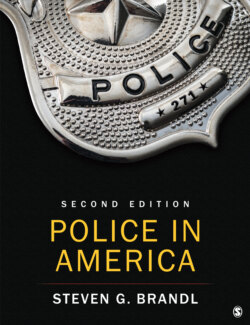Читать книгу Police in America - Steven G. Brandl - Страница 16
На сайте Литреса книга снята с продажи.
The Challenge of Policing a Free Society
ОглавлениеTo understand the police in the United States, it is important first to reflect on the idea that the United States is a free society. What exactly does that mean? There is much philosophical discussion and debate about this issue. On a practical level, obviously it does not mean that citizens can behave any way they want; people are not free to shoot other people because they are angry with them or to disregard traffic lights because they are in a hurry. That people in our society are free means that the government recognizes that human beings have certain basic human rights. For example, people in our society have the right to work, to go to school, to express their opinions, to protest government, to have privacy from government, to worship whatever god they believe in, to reproduce, and to own property. At the same time, the police, as an arm of the government, have the power and authority to regulate the conduct of citizens. Given our free society, the police are sometimes put in a peculiar situation: They are expected to protect citizens’ rights and regulate the conduct of citizens.
free society: A society in which the government recognizes that human beings have certain basic human rights.
Photo 1.3 The Bill of Rights of the U.S. Constitution limits the power of the police and provides citizens protections from the police.
©iStockphoto.com/RyanJLane
The freedoms that people enjoy in our society are dynamic, always changing. For example, in the aftermath of the terrorist attacks of September 11, 2001, there was a massive reorganization of federal law enforcement efforts and the passage of significant new legislation (the USA PATRIOT Act in particular) that provided new powers to the government in collecting information on citizens. As discussed in more detail later in this book, for better or for worse, and accurately or not, this law was presented as a new tool in the war against terrorism. It increased the power of the government and correspondingly decreased the rights and privacy of citizens. Conversely, in the 1960s, a series of landmark U.S. Supreme Court decisions, including Mapp v. Ohio (1961) and Miranda v. Arizona (1966), gave citizens more freedoms from the government but, some argued, “handcuffed the police.”
Freedom is a relative concept. Much variation exists among societies and governments in the freedoms that are afforded to their citizens (Exhibit 1.2). Therefore, in some societies, the police are oriented more toward exerting the power of the government than protecting citizens’ rights. If citizens have fewer rights, there are fewer rights to protect. If citizens have fewer rights, the government has more power. If the government has more power, the police have more power.
The U.S. Constitution—and in particular the Bill of Rights, which comprises the first ten amendments—articulates several freedoms of the nation’s citizens (see Appendix A). These are best considered civil liberties or freedoms from government. The Bill of Rights is not just words on paper. These are rules that the government must abide by in treating citizens. The government in this case often refers specifically to the police and the criminal justice system. The police are not free to do whatever they want. Because of the Constitution and the legal decisions associated with it, the police have rules to follow in dealing with citizens.
Bill of Rights: The first ten amendments to the U.S. Constitution; these amendments articulate several basic freedoms of the nation’s citizens.
